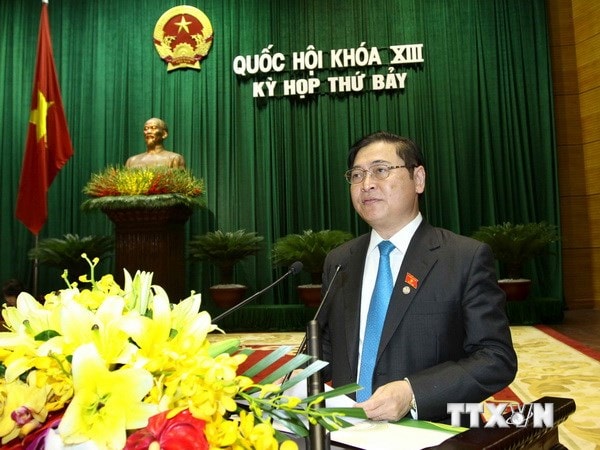National Assembly discusses the Law on Inland Waterway Traffic
Continuing the session program, on the morning of May 21, National Assembly deputies worked in the Hall to discuss a number of contents with different opinions of the draft Law amending and supplementing a number of articles of the Law on Inland Waterway Traffic.
 |
| Chairman of the National Assembly's Committee on Science, Technology and Environment Phan Xuan Dung presented the Report on the Law on Inland Waterway Traffic. Photo: VNA |
| RELATED NEWS |
|---|
Opinions suggest that legal regulations for some inland waterway traffic activities in water areas that are not "inland waterways" should not be added to the "scope of regulation" but that regulations on "application of law" to water surfaces that are not inland waterways should be made in an Article in Chapter IX of the 2004 Law on Inland Waterway Traffic to ensure legal logic.
Delegates analyzed the characteristics of Vietnam's natural conditions, and the fact that inland waterway traffic activities are still taking place on water areas from "the edge of the channel to the edge of the natural bank and on rivers, canals, and streams that have not been announced for transportation exploitation" (water areas that have not been managed or exploited for transportation).
Traveling in these waters poses many potential risks to traffic safety. Therefore, in order to ensure traffic safety for the activities of vehicles outside the scope of the waterway in cases of force majeure and in water areas that have not been organized to manage and exploit traffic; at the same time, to stipulate the responsibility of People's Committees at all levels in ensuring traffic safety in general, especially the responsibility in warning about dangerous areas for inland waterway traffic activities, it is reasonable to supplement regulations on the application of law to some activities of inland waterway vehicles outside the scope of the waterway and in water areas that have not been organized to manage and exploit traffic in Article 101a.
Specifically: “Vehicle operations outside the fairway and on water areas that have not been organized, managed, or exploited for transportation must comply with the provisions of this Law on inland waterway vehicles; crew members, vehicle drivers; traffic rules and signals of vehicles; inland waterway transport; inland waterway traffic accidents and inland waterway search and rescue, and other relevant provisions of law. People's Committees at all levels are responsible for organizing signaling in areas that are dangerous for the operations of vehicles outside the fairway and on water areas that have not been organized, managed, or exploited for transportation.”
According to the draft law, inland waterway ports are small-scale independent structures, including land and water areas in front of the port for vehicles to anchor, load and unload goods, pick up and drop off passengers and provide other support services. Inland waterway ports include cargo ports, passenger ports, general ports, cross-river passenger ports, specialized ports and residential ports.
Organizations and individuals when constructing inland ports and wharves must have written approval from the competent state management agency for inland waterway traffic.
According to delegate Truong Minh Hoang (Ca Mau), such a regulation is not appropriate because the public wharf must have written approval from the state management agency, which is "making it difficult" for the people.
The delegate cited an example in the Mekong Delta, specifically in Ca Mau province, where 50-60% of the population lives on the river and these people's houses all have public wharves. Now, having to ask for permission will cause difficulties for the people and make it difficult for state agencies to implement.
Discussing Article 98e, inland waterway traffic rescue, Clause 3 stipulates: “Rescued vehicles, ships, and fishing boats may be detained, temporarily detained, or auctioned by the rescue party to ensure payment of rescue fees,” some opinions are concerned because this provision can be exploited, valuable assets can be intentionally detained or intentionally auctioned.
There is a proposal to add a regulation that only if the rescued party is unable to pay can the property be held and auctioned to avoid cases of law evasion and profiteering.
During the discussion session, delegate Nguyen Ngoc Phuong (Quang Binh) proposed to include in the law the management of floating houses and means of transporting and fishing.
Delegate Pham Thi My Ngoc (Ninh Binh) proposed an absolute ban on alcohol use by drivers of inland waterway vehicles.
National Assembly delegates discussed and gave specific opinions on the contents of inland waterway development planning; management of channels and routes; registration of inland waterway vehicles; inspection of inland waterway vehicles...
During the remaining time of the morning, National Assembly deputies worked in groups, discussing the situation in the East Sea, China's illegal placement of the Haiyang Shiyou-981 drilling rig in Vietnam's exclusive economic zone and continental shelf; and Vietnam's policies and solutions.
In the afternoon, the National Assembly discussed in groups the draft Law and Ordinance Building Program for 2015, adjustments to the Law and Ordinance Building Program for the 13th and 2014 National Assembly; and the draft Law amending and supplementing a number of articles of the Law on Civil Aviation of Vietnam.
According to Vietnam+






